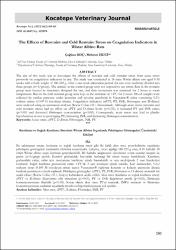The effects of restraint and cold restraint stress on coagulation ındicators in wistar albino rats
Künye
Koç, Ç. & Ekici, M. (2023). The Effects of Restraint and Cold Restraint Stress on Coagulation Indicators in Wistar Albino Rats . Kocatepe Veterinary Journal , 16 (2) , 160-165 . DOI: 10.30607/kvj.1239878Özet
The aim of this study was to investigate the effects of restraint and cold restraint stress from acute stress protocols on coagulation indicators in rats. The study was conducted in 18 male Wistar albino rats aged 8-10 weeks with a body weight of 180-220 g. After a one-week adaptation period, the rats were randomly divided into three groups (n=6/group). The animals in the control group were not exposed to any stress. Rats in the restraint group were housed in restrainers designed for rats, and their movement was restricted for 2 hours at room temperature. Rats in the cold restraint group were kept in the restrainer at +4°C for 2 hours. Blood samples were collected by cardiac puncture under ketamine and xylazine anesthesia in Vacutainer® tubes containing 3.2% sodium citrate (0.109 M trisodium citrate). Coagulation indicators (aPTT, PT, INR, fibrinogen, and D-dimer) were analyzed using an automated analyzer (Roche Cobas t511, Switzerland). Although acute stress (restraint and cold restraint stress) had no effect on aPTT and D-dimer levels (p>0.05), it increased PT and INR values (p<0.05) and decreased fibrinogen concentration (p<0.05). Consequently, acute stress may lead to platelet hypofunction in rats by prolonging PT, increasing INR, and decreasing fibrinogen concentration. Bu çalışmanın amacı, kısıtlama ve soğuk kısıtlama stresi gibi iki farklı akut stres protokolünün sıçanlarda pıhtılaşma göstergeleri üzerindeki etkilerini araştırmaktı. Çalışma, vücut ağırlığı 180-220 g olan, 8-10 haftalık 18 erkek Wistar albino sıçan üzerinde gerçekleştirildi. Bir haftalık adaptasyon sürecinden sonra sıçanlar rastgele üç gruba (n=6/grup) ayrıldı. Kontrol grubundaki hayvanlar herhangi bir strese maruz bırakılmadı. Kısıtlama grubundaki ratlar, ratlar için tasarlanmış kısıtlayıcı içinde barındırıldı ve oda sıcaklığında 2 saat hareketleri kısıtlandı. Soğuk kısıtlama grubundaki ratlar +4°C'de 2 saat kısıtlayıcı içinde tutuldu. Kan numuneleri, %3,2 sodyum sitrat (0.109 M trisodyum sitrat) içeren Vacutainer® tüplerine ketamin ve ksilazin anestezisi altında kardiyak punksiyon yoluyla toplandı. Pıhtılaşma göstergeleri (aPTT, PT, INR, fibrinojen ve D-dimer) otomatik bir analiz cihazı (Roche Cobas t511, İsviçre) kullanılarak analiz edildi. Akut stres (kısıtlama ve soğuk kısıtlama stresi) aPTT ve D-dimer düzeylerine etki etmezken (p>0.05), PT ve INR değerlerini artırdı (p<0.05), fibrinojen konsantrasyonunu düşürdü (p<0.05). Sonuç olarak akut stres, PT'yi uzatarak, INR'yi artırarak ve fibrinojen konsantrasyonunu azaltarak sıçanlarda trombosit hipofonksiyonuna yol açabilir.
Cilt
16Sayı
2Koleksiyonlar
- Cilt 16: Sayı 2 [14]



















